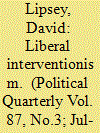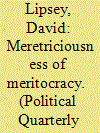| Srl | Item |
| 1 |
ID:
149224


|
|
|
|
|
| Summary/Abstract |
David Lipsey analyses the arguments made by former Labour prime minister Tony Blair in his Chicago speeches for armed liberal intervention in states which are abusing the human rights of their citizens. He traces these arguments back to previous advocates of such intervention such as W. E. Gladstone and Woodrow Wilson. The arguments of Blair and advocates are often compelling in principle. However, in most cases—Iraq and Libya are examples—the practical consequences of military action turn out to be disastrous. Though opposing pacifism, and the ill-thought-out hostility to all things military of Labour's current leader Jeremy Corbyn, Lipsey's advice to those thinking of intervening is: don't.
|
|
|
|
|
|
|
|
|
|
|
|
|
|
|
|
| 2 |
ID:
130948


|
|
|
|
|
| Publication |
2014.
|
| Summary/Abstract |
Meritocracy has become the creed of all three British political parties. There is a consensus that progress towards it has stalled. In fact, it is doubtful how widespread the advance to meritocracy ever was and how far short of achieving it Britain fell. In any case, meritocracy, if it is not accompanied by greater equality of outcome, would not promote a happier society. It would make the rich more unrestrained in their greed and the poor more miserable thinking their poverty their own fault.
|
|
|
|
|
|
|
|
|
|
|
|
|
|
|
|
| 3 |
ID:
107200


|
|
|
|
|
| Publication |
2011.
|
| Summary/Abstract |
Britain's constitution has changed dramatically over the past forty years in which the author has been involved in national politics: devolution, the supremacy of EU law, the greater willingness of the judiciary to intervene in political issues and new human rights legislation. However these changes have been essentially random, argues David Lipsey, lacking any binding theme. These changes continue under the new coalition government. However the even greater changes to British politics have essentially a single source: the dramatic change in social class in Britain and its impact on electoral politics-for example the rise of the media and the decline of ideology
|
|
|
|
|
|
|
|
|
|
|
|
|
|
|
|
| 4 |
ID:
092411


|
|
|
|
|
| Publication |
2009.
|
| Summary/Abstract |
The Lords beats the Commons hands-down in scrutinising legislation, but it is also a repository of informed opinion to serve the nation. It is, that is, so long as it remains appointed not elected.
|
|
|
|
|
|
|
|
|
|
|
|
|
|
|
|